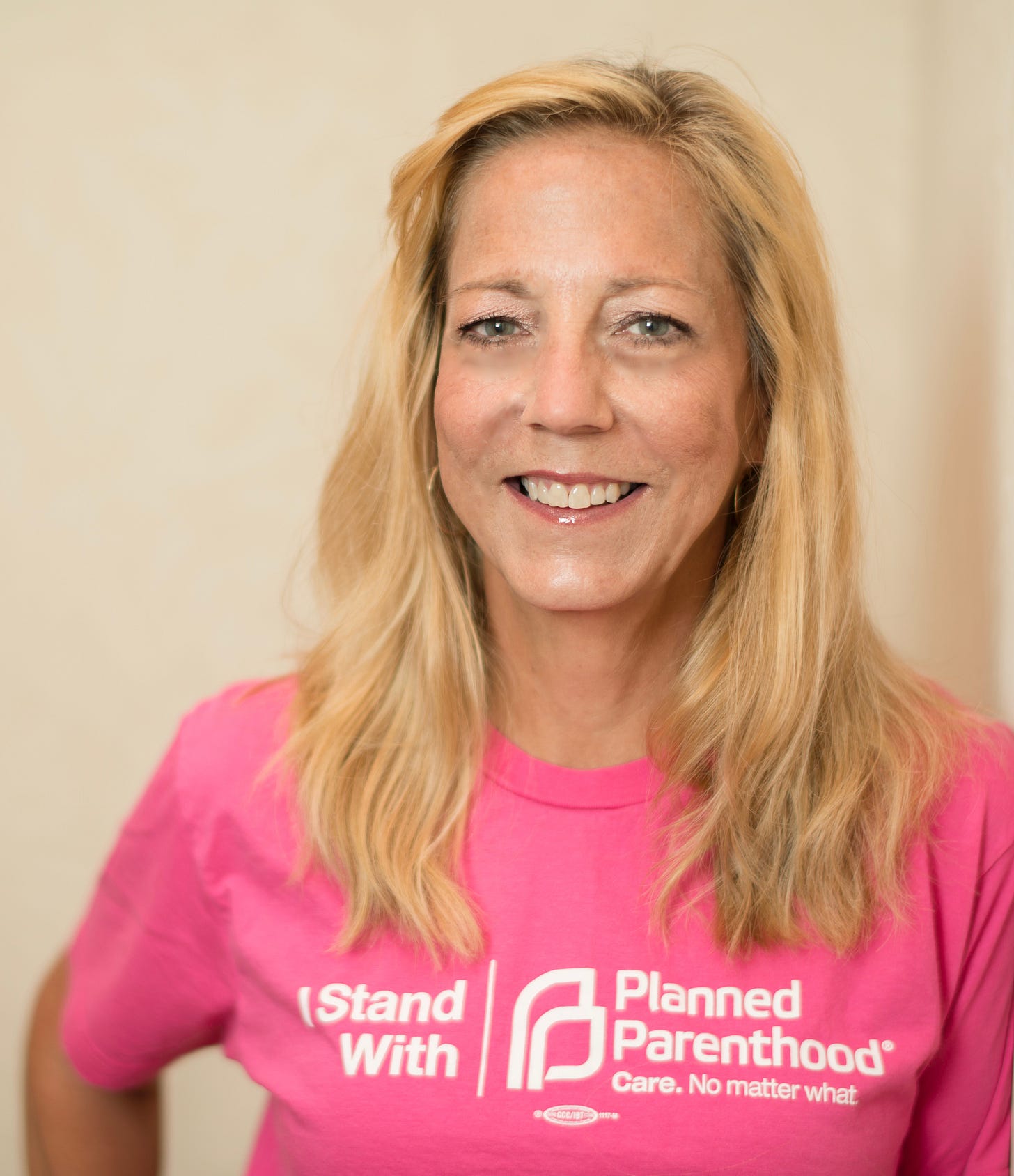Marking One Year Under South Carolina's Abortion Ban
Stories of suffering from Planned Parenthood South Atlantic
Honored to host Vicki Ringer for the newsletter today, one of our state’s staunch defenders of reproductive rights. Ringer is the director of public affairs for Planned Parenthood South Atlantic and oversees policy, government relations and electoral work in South Carolina. Planned Parenthood South Atlantic provides health care to more than 12,000 people from all 46 counties at its health centers in Columbia and Charleston. They provide routine health care, well-woman exams, birth control, and abortion, enabling our state's residents to control their own reproductive health. Thank you to Vicki and the girls and women here for sharing their stories. We fight for them.
Menopause came early for me. So early that when it started, I thought I was pregnant and had a silent freak-out. My only child was in high school, and I was working 60 hours a week. Our economy was in a freefall and the housing crisis forced my husband out of his work as a homebuilder. I didn’t know if I could handle pregnancy, let alone if we could handle a baby—financially, medically, or mentally. But I felt assured then that together we would make the decision that was right for us, our family, and our future—without government interference.
Fast forward 15 years—I’m still the mother of just one child and now a grandmother to the perfect two-year-old boy. Menopause is still a drag. But I no longer feel that same assurance I did before. Because now, people who learn they’re pregnant and aren’t sure how to handle it don’t have the options I did. My daughter, my friends, all the people in South Carolina, and nearly half the states in our nation no longer have options. It’s a cruelty that people in my generation had never known or fathomed.
I still work 60+ hours a week but now I do it for Planned Parenthood South Atlantic where it is my goal to restore abortion rights for our residents, among a thousand other things we do every day to care for the people who need us. It is not a job. It’s a mission with purpose.
By virtue of my work, I’ve met incredible people, and I hear all their brave stories. Stories I’d like to share with you today—with their permission, though some names have been changed to protect their privacy. Because this is not a faceless issue and they deserve to be heard.
After trying for years to get pregnant, Jill and Matt were thrilled to be expecting a daughter. At their 20-week diagnostic ultrasound and with more testing to follow, they learned their baby had a devastating heart problem and—if she survived—would need an immediate heart transplant. If she survived, she would suffer immense pain and would not live long. Jill and Matt could not, would not, put their baby or themselves through that. They decided that an abortion was the best decision for them and for their family. Although South Carolina’s abortion ban technically has an exception for fatal fetal anomalies, because their baby could live for a short time, their doctor could not provide an abortion. Jill and Matt traveled out of state for an abortion and came home to grieve their immense loss. Yet when they took their grief and heartbreak to their legislators—speaking at the State House to share their story—lawmakers looked them in the eye and didn’t give a damn about their suffering.
Katie is 11. She’s 5 feet tall and weighs 88 pounds. She had just gotten her first period and was still unsure what that meant when she was raped by a family “friend.” She didn’t know what that meant either— or what it meant when your next period doesn’t come. Because she didn’t even know that an 11-year-old could get pregnant. She told no one. It was only when her mother noticed that Katie wasn’t using period products, was gaining a little weight, and wasn’t her usual happy self that anyone suspected a thing—let alone learned the awful truth. But as if the heartbreak and cruelty Katie already experienced hadn’t been enough, when they sought an abortion, they were denied one by the state of South Carolina. Because they learned then that Katie was 14 weeks into her pregnancy and South Carolina’s exception for rape and incest victims stops at 12 weeks. The doctor was devastated that she couldn’t help Katie with the care she knew was needed. Katie and her mom had to travel out of state for an abortion.
Emma, pregnant with her third and very wanted baby, didn’t feel well. At an appointment with her obstetrician, she discussed her symptoms. But as that appointment and ultrasound got longer and more providers entered the room, Emma learned there was trouble. An infection had consumed her baby. Fetal organs were not developing. Doctors saw no way for her baby to survive and feared continuing pregnancy with this infection would ultimately claim Emma’s life. Fearful of jail or worse, doctors were unsure how to advise Emma and her husband. Ultimately, her doctor did call Emma at night and told her that while she couldn’t advise her definitively if she were in Emma’s shoes, she’d terminate the pregnancy. Again, there is an exception for a fatal fetal anomaly, but because the doctors had no clear diagnosis for Emma, they could not provide an abortion in South Carolina. Like Jill and Matt before them, Emma and her husband had no choice but to leave their home and travel to another state for an abortion. At a cost of more than $20,000 that insurance didn’t cover, they were reliant on abortion funds to cover some of their costs. Grandparents had to fly in from out of state to care for their other two children.
Taylor recently graduated from college and is finding her way in her career. She’s in a committed relationship but knows she’s not ready to be a parent. That’s why she got an IUD—one of the most effective methods of birth control. She even tracks her periods meticulously. So when her period didn’t start on the day she expected, Taylor took a pregnancy test. Then when she learned she was pregnant, Taylor immediately tried to make an appointment for an abortion. But because of South Carolina’s abortion ban (even as meticulous as she was or as early as she discovered she was pregnant) Taylor was unable to obtain an abortion in South Carolina. She had to travel to North Carolina three times before she got the abortion she wanted and needed
All of these situations show the variety of circumstances under which people have been denied abortions in South Carolina – all of them valid and important. None of them should have been denied care. As long as women continue to die from pregnancy and childbirth—and South Carolina has the 8th highest rate of maternal mortality in this country—all abortions are for health reasons.
Moving into election season, this is our chance to say this abortion ban is unacceptable for South Carolina—that what happened to Jill, to Katie, to Emma, to Taylor, to everyone, is unacceptable. Every Republican who is running for re-election has voted to ban abortion. They’ve said they intend to go further in January by passing a total abortion ban with no exceptions. Then they’ll ban contraceptives and IVF. This isn’t hyperbolic or fear-mongering. They’ve told us they want to do this. Believe them.
Our only option is to vote them out of office. Even if running unopposed, don’t vote for candidates who voted to ban abortion. If you don’t know where candidates stand on abortion or the bigger reproductive health issue, ask them. Ask me.
We will never change the legislative plays until we change the players.






And that poor child who was also failed when she did not receive comprehensive Sex Ed and so didn’t have the knowledge to understand what had happened to her or tell anyone.
Devastating. Thank you for the work you’re doing. Truly.